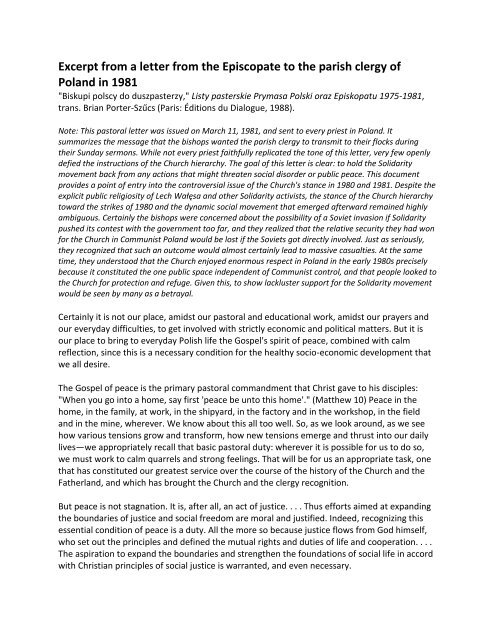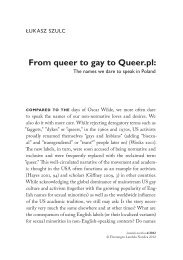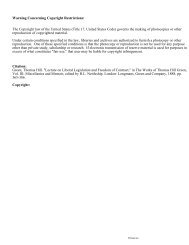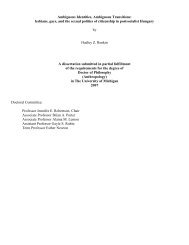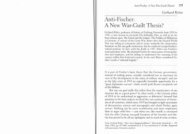Excerpt from a letter from the Episcopate to the parish clergy of ...
Excerpt from a letter from the Episcopate to the parish clergy of ...
Excerpt from a letter from the Episcopate to the parish clergy of ...
You also want an ePaper? Increase the reach of your titles
YUMPU automatically turns print PDFs into web optimized ePapers that Google loves.
<strong>Excerpt</strong> <strong>from</strong> a <strong>letter</strong> <strong>from</strong> <strong>the</strong> <strong>Episcopate</strong> <strong>to</strong> <strong>the</strong> <strong>parish</strong> <strong>clergy</strong> <strong>of</strong><br />
Poland in 1981<br />
"Biskupi polscy do duszpasterzy," Listy pasterskie Prymasa Polski oraz Episkopatu 1975-1981,<br />
trans. Brian Porter-Szűcs (Paris: Éditions du Dialogue, 1988).<br />
Note: This pas<strong>to</strong>ral <strong>letter</strong> was issued on March 11, 1981, and sent <strong>to</strong> every priest in Poland. It<br />
summarizes <strong>the</strong> message that <strong>the</strong> bishops wanted <strong>the</strong> <strong>parish</strong> <strong>clergy</strong> <strong>to</strong> transmit <strong>to</strong> <strong>the</strong>ir flocks during<br />
<strong>the</strong>ir Sunday sermons. While not every priest faithfully replicated <strong>the</strong> <strong>to</strong>ne <strong>of</strong> this <strong>letter</strong>, very few openly<br />
defied <strong>the</strong> instructions <strong>of</strong> <strong>the</strong> Church hierarchy. The goal <strong>of</strong> this <strong>letter</strong> is clear: <strong>to</strong> hold <strong>the</strong> Solidarity<br />
movement back <strong>from</strong> any actions that might threaten social disorder or public peace. This document<br />
provides a point <strong>of</strong> entry in<strong>to</strong> <strong>the</strong> controversial issue <strong>of</strong> <strong>the</strong> Church's stance in 1980 and 1981. Despite <strong>the</strong><br />
explicit public religiosity <strong>of</strong> Lech Wałęsa and o<strong>the</strong>r Solidarity activists, <strong>the</strong> stance <strong>of</strong> <strong>the</strong> Church hierarchy<br />
<strong>to</strong>ward <strong>the</strong> strikes <strong>of</strong> 1980 and <strong>the</strong> dynamic social movement that emerged afterward remained highly<br />
ambiguous. Certainly <strong>the</strong> bishops were concerned about <strong>the</strong> possibility <strong>of</strong> a Soviet invasion if Solidarity<br />
pushed its contest with <strong>the</strong> government <strong>to</strong>o far, and <strong>the</strong>y realized that <strong>the</strong> relative security <strong>the</strong>y had won<br />
for <strong>the</strong> Church in Communist Poland would be lost if <strong>the</strong> Soviets got directly involved. Just as seriously,<br />
<strong>the</strong>y recognized that such an outcome would almost certainly lead <strong>to</strong> massive casualties. At <strong>the</strong> same<br />
time, <strong>the</strong>y unders<strong>to</strong>od that <strong>the</strong> Church enjoyed enormous respect in Poland in <strong>the</strong> early 1980s precisely<br />
because it constituted <strong>the</strong> one public space independent <strong>of</strong> Communist control, and that people looked <strong>to</strong><br />
<strong>the</strong> Church for protection and refuge. Given this, <strong>to</strong> show lackluster support for <strong>the</strong> Solidarity movement<br />
would be seen by many as a betrayal.<br />
Certainly it is not our place, amidst our pas<strong>to</strong>ral and educational work, amidst our prayers and<br />
our everyday difficulties, <strong>to</strong> get involved with strictly economic and political matters. But it is<br />
our place <strong>to</strong> bring <strong>to</strong> everyday Polish life <strong>the</strong> Gospel's spirit <strong>of</strong> peace, combined with calm<br />
reflection, since this is a necessary condition for <strong>the</strong> healthy socio-economic development that<br />
we all desire.<br />
The Gospel <strong>of</strong> peace is <strong>the</strong> primary pas<strong>to</strong>ral commandment that Christ gave <strong>to</strong> his disciples:<br />
"When you go in<strong>to</strong> a home, say first 'peace be un<strong>to</strong> this home'." (Mat<strong>the</strong>w 10) Peace in <strong>the</strong><br />
home, in <strong>the</strong> family, at work, in <strong>the</strong> shipyard, in <strong>the</strong> fac<strong>to</strong>ry and in <strong>the</strong> workshop, in <strong>the</strong> field<br />
and in <strong>the</strong> mine, wherever. We know about this all <strong>to</strong>o well. So, as we look around, as we see<br />
how various tensions grow and transform, how new tensions emerge and thrust in<strong>to</strong> our daily<br />
lives—we appropriately recall that basic pas<strong>to</strong>ral duty: wherever it is possible for us <strong>to</strong> do so,<br />
we must work <strong>to</strong> calm quarrels and strong feelings. That will be for us an appropriate task, one<br />
that has constituted our greatest service over <strong>the</strong> course <strong>of</strong> <strong>the</strong> his<strong>to</strong>ry <strong>of</strong> <strong>the</strong> Church and <strong>the</strong><br />
Fa<strong>the</strong>rland, and which has brought <strong>the</strong> Church and <strong>the</strong> <strong>clergy</strong> recognition.<br />
But peace is not stagnation. It is, after all, an act <strong>of</strong> justice. . . . Thus efforts aimed at expanding<br />
<strong>the</strong> boundaries <strong>of</strong> justice and social freedom are moral and justified. Indeed, recognizing this<br />
essential condition <strong>of</strong> peace is a duty. All <strong>the</strong> more so because justice flows <strong>from</strong> God himself,<br />
who set out <strong>the</strong> principles and defined <strong>the</strong> mutual rights and duties <strong>of</strong> life and cooperation. . . .<br />
The aspiration <strong>to</strong> expand <strong>the</strong> boundaries and streng<strong>the</strong>n <strong>the</strong> foundations <strong>of</strong> social life in accord<br />
with Christian principles <strong>of</strong> social justice is warranted, and even necessary.
There is no doubt that work on awakening <strong>the</strong> conscience and streng<strong>the</strong>ning social justice is<br />
necessary in our Fa<strong>the</strong>rland. The Church was aware <strong>of</strong> this when it began <strong>to</strong> trace out<br />
domestically <strong>the</strong> lines <strong>of</strong> a new socio-economic system. The Church did not just begin <strong>to</strong>day <strong>to</strong><br />
work on propagating <strong>the</strong> principles <strong>of</strong> a healthy social order, on defending personal rights,<br />
particularly <strong>the</strong> conditions <strong>of</strong> human labor—<strong>the</strong> Church has been doing this since <strong>the</strong> first years<br />
<strong>of</strong> this new stage in Polish his<strong>to</strong>ry. It is <strong>of</strong>ten forgotten that particularly <strong>the</strong>n, when everything<br />
was silenced under <strong>the</strong> pressure <strong>of</strong> political terror, <strong>the</strong> Church alone did not back down, and its<br />
bishops and priests paid for <strong>the</strong>ir courage with imprisonment, with <strong>the</strong> loss <strong>of</strong> <strong>the</strong>ir Church<br />
positions, and with heavy criminal fines. The Church, <strong>the</strong> <strong>Episcopate</strong> <strong>of</strong> Poland, <strong>the</strong> bishops<br />
s<strong>to</strong>od up in defense <strong>of</strong> those who were oppressed and wronged by <strong>the</strong> government during <strong>the</strong><br />
various periods <strong>of</strong> social tension in our country.... A great movement has been born that aspires<br />
<strong>to</strong> create self-governing associations, <strong>the</strong> existence <strong>of</strong> which is <strong>the</strong> natural right <strong>of</strong> every man<br />
and <strong>of</strong> <strong>the</strong> entire Nation. It is an individual right, regardless <strong>of</strong> <strong>the</strong> already existing forms <strong>of</strong><br />
associations, that people have <strong>the</strong> right <strong>to</strong> create <strong>the</strong> associations that best meet <strong>the</strong>ir<br />
personal, social, pr<strong>of</strong>essional, or economic needs. It is not acceptable <strong>to</strong> create some sort <strong>of</strong><br />
monopoly for a certain political group or <strong>to</strong> make concessions for one social strata <strong>to</strong> <strong>the</strong><br />
exclusion <strong>of</strong> o<strong>the</strong>r citizens. . . .<br />
The Holy Fa<strong>the</strong>r, in his speech <strong>to</strong> pilgrims <strong>to</strong> Poland (January 21 <strong>of</strong> this year), wishing <strong>the</strong><br />
Fa<strong>the</strong>rland peace, also wished all citizens level-headedness and continued development.<br />
Precisely <strong>the</strong> issue <strong>of</strong> level-headedness has momen<strong>to</strong>us social and civic meaning. . . . The<br />
powerful desire <strong>to</strong> do good for <strong>the</strong> children <strong>of</strong> <strong>the</strong> common Fa<strong>the</strong>rland is in tension here with a<br />
situation in which one must move forward patiently, peacefully, and with a long time horizon.<br />
After all, it is not possible <strong>to</strong> repair <strong>from</strong> one day <strong>to</strong> <strong>the</strong> next all <strong>the</strong> injustices that have<br />
occurred in <strong>the</strong> life and consciousness <strong>of</strong> <strong>the</strong> Nation. . . . We need level-headedness and<br />
systematic efforts <strong>from</strong> all <strong>the</strong> national, moral, social, and state forces—in order <strong>to</strong> do this as<br />
well as possible, without creating new injustices or national losses. Thus it would be harmful <strong>to</strong><br />
try s<strong>to</strong>p initiatives already underway, or <strong>to</strong> make difficulties for citizens when one sees healthy<br />
and constructive work <strong>to</strong>wards overcoming evil in <strong>the</strong> positive building <strong>of</strong> healthy socioeconomic<br />
development, for <strong>the</strong> good <strong>of</strong> all <strong>the</strong> citizens <strong>of</strong> <strong>the</strong> common Fa<strong>the</strong>rland. . . .<br />
The beloved servants <strong>of</strong> <strong>the</strong> People <strong>of</strong> God in our Fa<strong>the</strong>rland will be particularly alert <strong>to</strong><br />
maintain this social peace and level-headedness so that we might achieve fur<strong>the</strong>r development<br />
in <strong>the</strong> social aspiration for justice. . . . Since in this heated times many initiatives for renewal are<br />
arising, and some <strong>of</strong> <strong>the</strong>se will have a short lifespan, priests, who have a more fundamental and<br />
long-term religious and pas<strong>to</strong>ral task, ought not <strong>to</strong> join <strong>the</strong>ir pas<strong>to</strong>ral work with political<br />
interventions. After all, <strong>the</strong> Church has never in its his<strong>to</strong>ry become dependent upon political or<br />
pseudo-political groups and it never gave itself over in service <strong>to</strong> such groups. Thus priests, who<br />
are called <strong>to</strong> serve <strong>the</strong> entire People <strong>of</strong> God, ought not <strong>to</strong> join any initiative, even <strong>the</strong> most<br />
noble. aimed at political renewal. The <strong>clergy</strong> should limit itself <strong>to</strong> bringing everyone religious,<br />
moral, and charitable assistance, preserving its strength and time for its proper pas<strong>to</strong>ral calling<br />
among <strong>the</strong> children <strong>of</strong> <strong>the</strong> Divine Fa<strong>the</strong>rland. Priests will not sign any declarations <strong>of</strong> a political
or public character, nor make any protests <strong>of</strong> any kind. Instead, <strong>the</strong>y will inform <strong>the</strong>ir bishops if<br />
<strong>the</strong>y observe <strong>the</strong> violation <strong>of</strong> <strong>the</strong> moral or civil rights <strong>of</strong> <strong>the</strong> faithful.<br />
We trust that only in this way will we act in accordance with <strong>the</strong> instructions <strong>of</strong> <strong>the</strong> Holy Fa<strong>the</strong>r,<br />
for <strong>the</strong> peace <strong>of</strong> our Fa<strong>the</strong>rland, in <strong>the</strong> spirit <strong>of</strong> level-headedness, on <strong>the</strong> path <strong>to</strong>wards fur<strong>the</strong>r<br />
growth."


